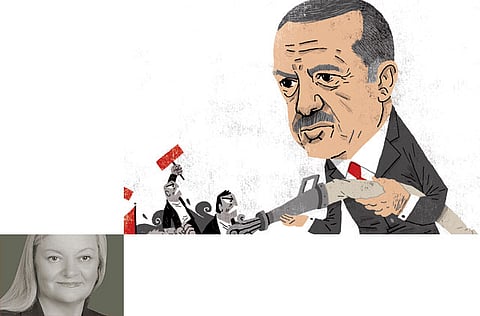Erdogan seems to be going the Al Assad way
Turkey leader would be advised to climb down from his lofty pinnacle soon enough

Civil unrest in Istanbul — that began as a peaceful protest by liberals against the demolition of Taksim Gezi Park — was met with water cannon, tear gas and a media blackout on demonstrations, eliciting calls around the country for Prime Minister Recep Tayyip Erdogan to step down. More than 900 have been arrested while 1,000 have been injured. It has since emerged that people’s discontent runs far deeper than the issue of mere downing of trees to make way for a commercial development. They fear creeping authoritarianism and religious conservatism on the part of the Islamist government, which is gradually eroding their personal freedoms and altering Turkey’s secular visage.
In recent years, female students have been given the right to attend university wearing headscarves. Students as young as 11 have been permitted to attend religious schools and, last week, the government curtailed the hours during which alcohol could be consumed and pronounced that areas around mosques would be completely dry. Erdogan, who has enjoyed the top job since 2002, would like to change the constitution to allow him to run for office again. The head of the ruling Justice and Development Party’s (AKP) Istanbul branch confirmed the suspicions of liberals, saying they will no longer be his party’s partners because “the Turkey that is to be built will not feature a future that they accept or desire ...”
On Saturday, Istanbul’s iconic Taksim Square could almost have been mistaken for Cairo’s Tahrir Square during the January 25 revolution. Shops and hotels distributed water to demonstrators and sympathetic medics flocked to the area to set-up mobile health facilities. Sympathisers banged pots and blew whistles from their apartment balconies.
Egypt’s outspoken political television commentator Amr Adeeb gleefully announced that Turkey has contracted Egypt’s influenza; others labelled the unforeseen events as “the Turkish Spring”. It’s too early to make that call. The seeds of protest can go two ways, depending on how committed Erdogan’s detractors are to bringing him down. A determined state crackdown could either stifle dissent or alternatively ignite a full-scale revolution that could open the door to a military coup.
The Turkish military regards itself as the guardian of domestic stability and as a loyal Kemalist organisation, the protector of the nation’s secular values. It is no secret that relations between the armed forces and the ruling AKP, which has succeed in bolstering its power at the military’s expense, are strained. In recent years, military personnel, politicians and members of the judiciary have been charged with sedition.
Pot calling the kettle black
Erdogan heartily supported the toppling of Egyptian president Hosni Mubarak and was recognised by US President Barack Obama for being “at the forefront of efforts to achieve a democratic Syria”. Ironically, he may be on the point of stepping into their uncomfortable shoes, even though he has been super successful in making his country an economic powerhouse — the envy of Turkey’s European neighbours. His moderate style of governance was viewed as a template for Islamic governments elsewhere.
Unsurprisingly, Syrian President Bashar Al Assad, who last year condemned Erdogan, saying “he thinks he’s a Caliph”, a sultan who hopes for a Muslim Brotherhood take-over of Syria so he can control the region, must be gloating over these new developments. Syria’s Minister of Information, Omran Al Zohbi, said “the oppression by Turkish Prime Minister Erdogan against nonviolent demonstrations is something that is unrealistic and reveals that he is detached from reality”. Talk about the pot calling the kettle black!
Unfortunately, Erdogan appears to have learned nothing from the mistakes of Mubarak and Al Assad who arguably could have nipped anti-government sentiments in the bud had they replaced their stubborn arrogance with compromise from the get-go. Like those besieged leaders, the Turkish Prime Minister is unshakeable — a stance that is fuelling opposition. Protesters accuse Erdogan of hypocrisy, accusing him of backing democratic rights in Syria while attempting to gag those who oppose his own policies.
During a televised address to the nation last Saturday, Erdogan pledged to proceed with the construction of a shopping precinct, which would destroy a rare green city oasis. Rather than adopt a conciliatory approach he dared the protesters to take on the authorities.
“Police were there yesterday, they’ll be on duty today and also tomorrow because Taksim Square cannot be an area where extremists are running wild,” he said. “If this is about staging a protest, about a social movement, I would gather 200,000 where they gather 20 and where they gather 100,000, I would gather one million party supporters. Let’s not go down that road.” That was exactly the defiant road Al Assad took. Look where it has got him today! Erdogan could easily have answered the concerns of the park’s supporters by saying that the project was open to discussion. But just like Al Assad, he is blaming extremists for stoking dissent.
The US, the European Union and various human rights groups maintain that Turkish riot police were too heavy-handed. Erdogan attacked “the preaching of foreign governments” counselling that they “should first look at their own countries,” — just the sort of thing Mubarak, Muammar Gaddafi and Al Assad were saying all along.
If Erdogan loves his country and is interested in preserving its stability and economic progress, he would be advised to climb down from his lofty pinnacle soon enough to engage in dialogue, else risk being written-off as yet another egotistical would-be dictator with a one-way ticket out.



